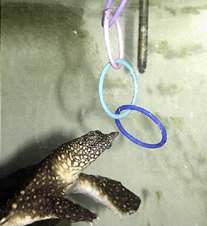A few short decades ago discussing mental health in reptiles would have been considered beyond the fringes of even the famous American fringe-toed lizard. One may have seemed out of their mind if they even raised it. Nowadays, that story is changing as studies increasingly show that everything from neuroanatomy of the brain and cognitive capacity to sentience among reptiles not only parallels but in some cases exceeds that of many birds and mammals – oh, and humans!
Mental health is fundamental to general health
In reptiles, adaptive plasticity to unnatural conditions is weak
Reptiles, along with their other exotic compatriots, often do poorly in captivity, as evidenced by high levels of morbidity and premature mortality. A large part of this miserable story directly relates to defective husbandry, deprived conditions and depauperate lifestyles. Another part is entirely due to the biology inherited by reptiles and others. In reptiles, adaptive plasticity to unnatural conditions is weak. This issue is further compounded by strong ancestral innate drive states that predetermine expectations for life in the wild – with all of its space, diversity and biologically anticipated challenges. Captivity turns all that on its head.
Most animal caregivers can understand that whether temperatures are too high, humidity levels too low or diets too poor, all these and other stressors distinctly affect a creature’s body because the physical connection is obvious. However, other major stressors, such as aggressive co-occupants, invasive light or noise, disturbances to rest and sleep, restrictive spatial conditions, atypical habitats and handling, in addition to many thwarted innate mental aspirations, also impact the body due to stress, immune response, morbidity and more via psychological processes – the mind.
The physical and the mental
Avoiding negative mental states and encouraging positive ones is now well recognised as essential to well-being. Yet how many reptile managers make catering for their mental health as important as their diets? Some zoos and academic biologists certainly adopt behavioural algorithms and other methods to gauge mental condition in reptiles. But to many, if not most, keepers, thinking of reptilian mental health probably trails or never appears next to healthcare protocols.
Brain, cognition and sentience
Basically, three elements warrant the new understanding of mental health needs in reptiles. Firstly, while the cerebral cortex of birds and mammals has long been attributed for their mental performance, reptiles possess a large pallium and other key structures that serve as functional alternatives, and forebrain anatomy broadly resembles that of birds and mammals.
Escaping mazes, solving puzzles to access food, engaging in play and counting items… are among multiple examples from scientific tests that show reptiles can not only hold their own, but also surpass many other mentally tasked ‘lab rats’

Secondly, cognition – learning, memory and problem-solving – is well described for reptiles. Essentially, escaping mazes, solving puzzles to access food (Figure 1), engaging in play and counting items (at least to five to six items) are among multiple examples from scientific tests that show reptiles can not only hold their own, but also surpass many other mentally tasked “lab rats”.
Thirdly, acknowledge sentience, which brings together thinking, feelings, emotions, consciousness and self-awareness in living beings. Sentience is fast becoming the keystone of modern welfare biology; after all, without it the difference between an animal and a Tamagotchi would be quite minimal. Reptiles easily pass the sentience test and, indeed in evolutionary terms, sentience long predates their emergence because it is also known in amphibians and fishes – and probably among invertebrates too. Any notions that reptiles are mentally uncomplicated based on superficial brain size or architecture now holds no sway.
Thinking ahead
It is no longer possible to suggest that reptiles are psychologically inferior to any other animal class, and that means we must pre-emptively account for, and where needed treat, their mental health needs
It is no longer possible to suggest that reptiles are psychologically inferior to any other animal class, and that means we must pre-emptively account for, and where needed treat, their mental health needs. With over 40 behavioural indicators of psychological states in reptiles, there are no reasons to ignore the condition of their mental health. In fact, the evidence for mental health care in reptiles is so clear that what is now needed is a change in mindset among the people who care for them.








